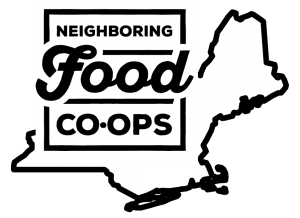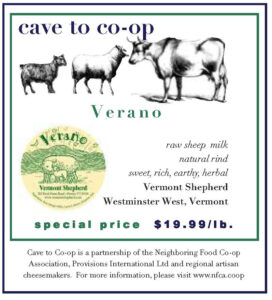 Your Neighboring Food Co-ops
Your Neighboring Food Co-ops
Locally Owned by More Than
150,000 People Like You!
In this Month’s E-News, check out:
- Co-ops Vote!
- Join the Virtual Co-op 5K
- NOFA Summer Conference Presentations
- August’s Cave to Co-op Cheese Special: Verano
- New England Farmers Union: Pandemic Relief is Unequal
- Co-op Calendar: Co-op Month, Co-op Impact
Neighboring Food Co-op Association joins National Voter Registration Day celebration on September 22, encouraging co-ops to support participation in elections this fall and spread the word: Co-ops Vote!
The passing of Congressman and Civil Rights activist John Lewis is a reminder that our political  democracy cannot be taken for granted. Lewis was a passionate advocate of economic democracy and the role of co-operatives in building more just and participatory communities. And the international co-operative movement has long been intertwined with grassroots efforts to advance and expand voting rights.
democracy cannot be taken for granted. Lewis was a passionate advocate of economic democracy and the role of co-operatives in building more just and participatory communities. And the international co-operative movement has long been intertwined with grassroots efforts to advance and expand voting rights.
As we look toward the elections in less than 100 days, the Neighboring Food Co-op Association (NFCA) is proud to be a National Voter Registration Day partner, encouraging food co-ops across the Northeast to organize in-person and online registration efforts as part of national celebrations on September 22. Our Food Co-ops are more than just a place to find healthy, local food. They are community hubs and especially during a pandemic are uniquely positioned to support voter registration, act as a conduit of critical voting information, and helping people make a plan to vote.
Individuals are also encouraged to visit vote.coop, a project of the National Rural Electric Cooperative Association (NRECA), where you can make sure your voter registration is up to date, register online where feasible, and see who is on the ballot in your area.
With a historic presidential election and important local races approaching, thousands of national, state, and local organizations and volunteers will be the driving force behind National Voter Registration Day, celebrating our democracy and working to ensure that everyone has a voice.
Get involved!
The NFCA has partnered with the National Cooperative Business Association (NCBA CLUSA) and NRECA to encourage co-ops and their members to get more involved. Here are some ideas:
- Include this story in your co-op’s next newsletter.
- Add the “Co-ops Vote” logo with a link to vote.coop to your co-op’s website.
- Offer a printed “Co-ops Vote” insert at the register.
- Invite candidates to speak virtually with your co-op.
- Use #CoopsVote, #Coops2020 and #NationalVoterRegistrationDay to promote voter registration efforts in social media.
- Be a “National Voter Registration Day” host, with an in-person voter registration drive — or watch this webinar from Non-profit Vote on Digital Voter Engagement Tools During the COVID-19 Pandemic.
- Check out NCBA CLUSA’s toolkit or visit vote.coop for more opportunities to get involved.
Whatever you decide to do, let us know about it by responding to this brief survey...
Your Neighboring Co-operators are participating in the Cooperative Development Foundation “Co-op 5K” — and you’re invited to join the team!
Co-operators from coast to coast are lacing up their sneakers and cranking up their headphones in  preparation for the Virtual Co-op 5k, a community event and fundraiser for the Cooperative Development Foundation (CDF). From Sunkist in California to Cabot in Vermont and everywhere in between, co-op member, employees, families and friends are signing up to participate. During the week of September 29 – October 2, a record number of teams will compete for such recognition as “Fastest Team” and “Team Spirit”.
preparation for the Virtual Co-op 5k, a community event and fundraiser for the Cooperative Development Foundation (CDF). From Sunkist in California to Cabot in Vermont and everywhere in between, co-op member, employees, families and friends are signing up to participate. During the week of September 29 – October 2, a record number of teams will compete for such recognition as “Fastest Team” and “Team Spirit”.
The Neighboring Food Co-op Association (NFCA) is joining in and inviting food co-op staff, directors, and members from across the Northeast to participate as we work to help raise funds for co-operative development, education, and growth. Run, walk, stroll or roll with us! Let’s have the Northeast co-op community well represented.
Joining the “Neighboring Co-operators” team is easy and your $35 registration will support the Cooperative Development Foundation (CDF):
- Download this FLYER to share with staff, directors, and members at your food co-op.
- When you’re ready to register, go to Coop5k20.racewire.com.
- Select “Virtual Runner” and sign the waiver.
- Select the Team Name, “Neighboring Co-operators” from the menu.
- Click “Confirm Registrants.”
- Your $35 registration will help support CDF’s co-operative development work!
Join us on October 1st as we walk/run together tokick off Co-op month, or participate from anywhere at any time between September 29 and Oct 2 — but you must register by September 1 to receive a Co-op 5K t-shirt in your desired size.
“The Cooperative Development Foundation is such an important resource for our food co-ops,” said Erbin Crowell, NFCA executive director. “From supporting educational initiatives, funding innovation, and providing relief to co-ops and their members during crises like COVID-19, CDF has been a key partner in the co-operative community — and participating in the Co-op 5K is a great way for us to give back.”
NOFA Summer Conference Presentations
We’ve been spreading the word about how co-ops build a more resilient food system and economy at the NOFA Summer Conference.
The latest edition of the NOFA/Mass Newsletter describes how food co-ops contribute to a more healthy,  just, and sustainable regional food system and can help our communities as we rebuild from the COVID-19 pandemic. Food co-ops have also been leaders in growing the market for organic farmers, and last year our member co-ops sold $97 million in organic products, reporting an average of 34% of store sales (compared with a national grocery store average of just 5%).
just, and sustainable regional food system and can help our communities as we rebuild from the COVID-19 pandemic. Food co-ops have also been leaders in growing the market for organic farmers, and last year our member co-ops sold $97 million in organic products, reporting an average of 34% of store sales (compared with a national grocery store average of just 5%).

Since 2012, the Neighboring Food Co-op Association (NFCA) has partnered with the Northeast Organic Farming Association (NOFA) to support education and advocacy on organic agriculture. And as this year’s NOFA Summer Conference was held online from July 20 to August 9, NFCA staff and partners presented on the role of co-ops in a more sustainable food system and economy:
- “How to Start or Convert to a Co-operative Business,” focused on how co-ops root business in communities, strengthen buy-in, and build a resilient and sustainable economy. This workshop will cover how co-ops work, the start-up process, and the benefits of converting to the co-op business model for owners of food/farm businesses. Presented by Bonnie Hudspeth, NFCA’s lead in Co-operative Development, and Adam Trott, Executive Director Valley Alliance of Worker Co-ops & Shared Capital Co-operative Member Relations Director.
- “Expanding Outlets for Your Farm Products,” is designed for producers interested in offering their products in food co-ops across our region. Food co-ops make a priority of supporting local farmers and producers, fostering farm sustainability through long-term relationships, transparency, and sales channels that offer volume, marketing, and stable, year-round markets. Presented by Suzette Snow-Cobb, NFCA Sourcing Coordinator, with Jacob Vincent, Merchandising Manager, Co-op Food Stores.
Check out the presentations: https://nfca.coop/nofasummerconference2020/
August’s Cave to Co-op Cheese Special: Verano
Verano from Vermont Shepherd, Westminster West, Vermont
In these times and with the challenges in our food supply, now it is as important as ever to support our  region’s farmers and producers such as our artisanal cheesemakers. Cave to Co-op is a partnership between Provisions International and the Neighboring Food Co-op Association (NFCA) to offer a delicious local cheese featured at a great price each month, making these products more easily available to co-op shoppers. For more information, visit: www.nfca.coop/CaveToCo-op.
region’s farmers and producers such as our artisanal cheesemakers. Cave to Co-op is a partnership between Provisions International and the Neighboring Food Co-op Association (NFCA) to offer a delicious local cheese featured at a great price each month, making these products more easily available to co-op shoppers. For more information, visit: www.nfca.coop/CaveToCo-op.
Verano is a raw sheep-milk, semi-hard cheese which is superb on a cheese plate with some rich and tart cherry preserves, tomato jam or quince paste and some crusty wheat or olive bread. You can also try some of the recipes we offer below.
David and Yesenia Ielpi Major are the cheesemakers at Vermont Shepherd, making cheeses only during the pasture season when the sheep graze on clover, grasses and wild herbs. Yesenia grew up summer’s milking cows on her dad’s farm in the Dominican Republic. David grew up tending his dad’s sheep in Vermont. Together, they make a mixed milk cheese called Invierno (winter) and a classic pure raw sheep milk tomme called Verano (summer). Verano has won many awards, including Best in Show at the American Cheese Society. The Robb Report called it “possibly the best sheep milk cheese in America.”
Vermont Shepherd cheeses are the oldest and most well-known of the country’s sheep and mixed milk cheeses. David and Yesenia and their family pasture and milk the sheep, make and age the cheese on a 250-acre farm in Westminster West, Vermont. Vermont Shepherd cheeses are descended from a variety of Pyrenees mountain cheeses, which is fitting because a large half of their family is Spanish. The cheese has won awards for Best Farmhouse Cheese in the country and Best of Show in the American Cheese Society’s annual competition since 1993. Today their family makes cheese in small, 10-30 wheel batches. Verano is a smooth and creamy, semi-hard cheese with a sweet, rich and earthy flavor. The rustic wheel has a rough, golden brown rind.
August is a perfect time to make Zucchini Pancakes with Verano cheese! Check out the recipe below as well as other recipes on our August Cave to Co-op page.
Zucchini Pancakes with Verano
Makes about 18 pancakes
Ingredients
- 3 medium firm zucchini
- ¾ cup shredded Verano
- 2 fresh eggs
- Bunch of flat leaf parsley, finely chopped
- Bunch of fresh dill, finely chopped
- ½ to ¾ cup all-purpose flour
- 1 package – about 2 tablespoons – of dry yeast
- 1 tablespoon salt
- Oil for frying
Directions
- Grate zucchinis into a colander, on medium-sized slots of a standing grater. Sprinkle 1 tablespoon of salt on top and mix into the grated zucchini. Set aside for about 15 minutes. The zucchini will produce a lot of juice and you want to try and remove most of it.
- After 15 minutes press down on the zucchini with a clean dish towel to squeeze out the juice. Repeat until most of the liquid is gone and the shredded zucchini is pretty dry.
- Place the zucchini is a medium bowl and sprinkle with the dry yeast, add the eggs, the herbs, the cheese and mix until blended.
- Sift the flour on top of this mixture and gently fold it in. You want the consistency of muffin batter. Cover the bowl and set aside for 30 minutes.
- Heat enough oil in a heavy skillet to generously cover the bottom by ¼ inch.
- When the oil is hot, scoop generous 2 tablespoon mounds of the batter into the pan. Cook on one side until golden brown, flip and brown the other side.
- Drain on paper towels and serve hot with sour cream and lemon.
Cave to Co-op is a partnership between Provisions International and the Neighboring Food Co-op Association (NFCA) to support artisanal cheese producers in our region and make their products more easily available to co-op shoppers. Since the program’s inception, ten years ago, 26 tons of local cheese have been sold through the Cave to Co-op program. That is a lot of delicious cheese!
For more information, visit www.nfca.coop/CaveToCo-op
New England Farmers Union: Pandemic Relief is Unequal
Pandemic Assistance Favors Certain Farmers Over Others
By Hannah Packman,NFU Communications Director
According to new analysis published last week by NBC News, the U.S. Department of Agriculture (USDA)  has disproportionately helped certain kinds of farmers more than others with its Coronavirus Food Assistance Program (CFAP).
has disproportionately helped certain kinds of farmers more than others with its Coronavirus Food Assistance Program (CFAP).
The publication asserts that the agency “favored large, industrialized farms over smaller, diversified ones, provided loopholes for corporate farms and sent sizable payments to foreign-owned operations.” Specifically, it found that:
- The top 10 percent of recipients have pocketed more than 60 percent of assistance distributed so far, with payments averaging $95,000
- The bottom 10 percent has received 0.26 percent of assistance, with payments averaging $300
- 2,300 farms received more than the $250,000 payment limit
- Six farms received more than $1 million
- 7,000 farms received less than $200
- The lowest-paid farmer received just seven cents
- More than a dozen foreign-owned operations received assistance totaling $3.6 million
- Corn, cattle, and dairy collectively claimed 80 percent of the funding
On top of stark disparities in payment rates, some farmers were excluded from the program entirely, either because the crops they grow were not covered or due to the way payments were calculated.
National Farmers Union (NFU) vice president of advocacy Mike Stranz told NBC News that the oversight may be due to the rushed nature of the program. “If USDA had had a little more time to craft this, maybe it would have shaped up differently,” he said “But Congress was in a hurry, and that put USDA in a difficult position with this program, having to process, understand and evaluate all of the losses that farmers were feeling in this pandemic in just two months.”
The organization continues to urge USDA to pursue solutions to these eligibility issues and ensure that all family farmers and ranchers can access the help they need.
Read the full article here.
Your Local Farmers & Fishermen Need You!
If you care about where your food comes from and want to support the people who produce it, consider joining NEFU as a Friend of the Farmer for just $15. Your membership will help ensure that our region’s producers and consumers are heard by policy makers here at home and in Washington, DC. For more information, please visit www.newenglandfarmersunion.org.
Co-op Calendar: Co-op Month, Co-op Impact
For More Co-op Events, Visit https://nfca.coop/calendar
SEPTEMBER 2020
September 11
More Than Good Food: Rekindling Membership for Co-op Success
Online workshop for NFCA Member Co-ops
September 24
Radically Rural Conference (Online)
Featuring: “Rebuilding our Rural Communities, Co-operatively!“
https://radicallyrural2020.sched.com
OCTOBER IS CO-OP MONTH!
October 5-6
Excellence in Member-Centric Governance & Management (Online)
An Executive Education Course offered by the International Centre on Co-operative Management at Saint Mary’s University in conjunction with the NCBA CLUSA Co-op Impact Conference
https://www.smu.ca/academics/sobey/member-centric-governance-management.html
October 7-9
NCBA CLUSA Co-op Impact Conference (Online)
https://ncbaclusa.coop/2020-co-op-impact-conference/
October 8
Co-operative Hall of Fame, Washington, DC
The Neighboring Food Co-op Association (NFCA) is a co-operative federation of 35 food co-ops and startup initiatives across New England, working together toward a shared vision of a thriving co-operative economy, rooted in a healthy, just, and sustainable food system and a vibrant community of co-operative enterprise.


